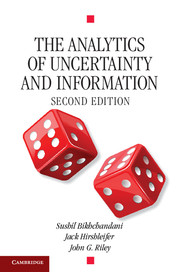Book contents
- Frontmatter
- Contents
- Acknowledgments
- In Memoriam
- Introduction
- Part I
- Part II
- 5 Information and Informational Decisions
- 6 Information and Markets
- 7 Strategic Uncertainty and Equilibrium Concepts
- 8 Informational Asymmetry and Contract Design
- 9 Competition and Hidden Knowledge
- 10 Market Institutions
- 11 Long-Run Relationships and the Credibility of Threats and Promises
- 12 Information Transmission, Acquisition, and Aggregation
- Index
- References
9 - Competition and Hidden Knowledge
Published online by Cambridge University Press: 05 August 2013
- Frontmatter
- Contents
- Acknowledgments
- In Memoriam
- Introduction
- Part I
- Part II
- 5 Information and Informational Decisions
- 6 Information and Markets
- 7 Strategic Uncertainty and Equilibrium Concepts
- 8 Informational Asymmetry and Contract Design
- 9 Competition and Hidden Knowledge
- 10 Market Institutions
- 11 Long-Run Relationships and the Credibility of Threats and Promises
- 12 Information Transmission, Acquisition, and Aggregation
- Index
- References
Summary
In the previous chapter we modeled situations with a large number of informed individuals on one side of the market, for example, potential purchasers of insurance who are aware of their individual likelihoods of suffering loss, or potential buyers who are aware of their own reservation prices. On the other side of the market we assumed a relatively uninformed individual possessing some degree of monopoly power – the insurance company, or the monopoly seller. The main issue addressed was contract design: an insurance deductible option to separate the better from poorer risks, or a schedule of options whereby the monopolist might induce the different types of buyers on the other side of the market to reveal themselves.
This chapter relaxes the assumption that the uninformed transactor has no close competitors. Instead, in each market a number of decision makers compete with one another in the design of contracts intended to separate the different types of trading partners they might be dealing with.
In Section 9.1 we consider situations where the traders on the uninformed side of the market move first, offering contracts aimed at screening their possible trading partners. Later, Section 9.3 takes up the opposite case in which the parties on the informed side of the market take the initiative, signaling their respective types by some choice of action. Interpolated between these two analyses is a discussion in Section 9.2 of “reactive equilibrium” in information-revealing situations.
- Type
- Chapter
- Information
- The Analytics of Uncertainty and Information , pp. 343 - 366Publisher: Cambridge University PressPrint publication year: 2013



